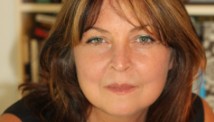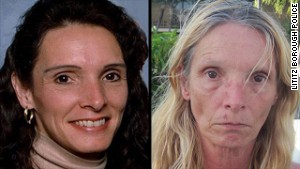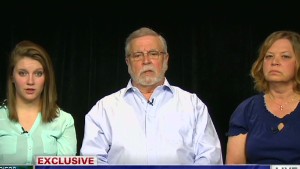Editor's note: Rahna Reiko Rizzuto's memoir "Hiroshima in the Morning" is a National Book Critics Circle Finalist. She is also the recipient of an American Book Award and a U.S./Japan Creative Artist Fellowship, and author of "Why She Left Us." She teaches creative writing at Goddard College. Follow her on Twitter @r3reiko
(CNN) -- Eleven years ago, Brenda Heist's marriage fell apart. She was trying to find housing and had been refused financial aid; she was depressed, in despair, crying on a park bench. And then she vanished. What a heartbreaking, terrifying time for her family, who suspected the worst, even declared her legally dead. When she reappeared to great media fanfare last week in Florida, reaction ranged from confusion to scorn.
Eleven years ago, my marriage also ended and I moved down the street, leaving the physical custody of my two sons with my husband.
The public outrage directed at Heist has been eerily similar to the hostility and anger I encountered when I wrote a memoir about it.
 Rahna Reiko Rizzuto
Rahna Reiko Rizzuto In my case, I stayed, co-parenting with my husband, setting rules and attending basketball games and dance shows and parent teacher conferences, and keeping a close, loving relationship with my children. We do homework together; we talk about girls, I teach them to cook (and to clean up!).
But I am a part-time parent, a noncustodial mother. For this decision, I have been threatened with death and sexual violence by strangers. I have been called human "garbage" and "worse than Hitler." And I am still the woman everyone refers to when they are talking about mothers who leave.
The hostility and abuse that is directed at the "mother who leaves" clearly does not depend on her actual leaving. We want our mothers to be long-suffering, to put their children's needs first and their own well-being last if there is time left.
We need her to get dinner on the table and the laundry done and the kids to school and the homework finished and the house clean and the cookies for the bake sale made and the school clothes purchased. Our society is hurting, schools are bankrupt, family finances are squeezed, drugs and guns and sex in the media and international terror are all bombarding our children and the person we designate to help kids negotiate all of this is their mother. It's a big job, too big for one person. Especially when she also has to work, and when she also has a life of her own to care for. But to say that, to act on it, is too much of a threat.
The hostility and abuse that is directed at the 'mother who leaves' clearly does not depend on her actual leaving.Rahna Reiko Rizzuto
I have said it. In my memoir, I took a hard, honest look at my ambivalence about motherhood, at my fears of not being good enough, and the loss of my identity as anything but a mother. My life was changing; my marriage was crumbling; I felt like I was being swallowed up. I loved my children deeply but I could no longer be a full-time mom and I had no other models. How could I remain part of their lives joyfully and not as a stifled, resentful failure? Would we all make it through OK?
Our family evolved. It was not quick and easy, in fact, we groped some and stumbled, but I had the support of their father and my boys are now thriving. When we look at it I realize that our family is not abhorrent or unnatural. It looks very much like many other families that have been through divorce, except Mom is the one who lives down the street.
Even so, once my book was published, I wrote about the backlash: the neighbors who crossed the street to avoid me, the friends who could not forgive me, the outbursts from strangers who asked, "How could you leave your children?" a most nonsensical question in my mind, since I was standing right there.
In the hateful response that followed, I noticed something. Many people very proudly proclaimed that they refused to read what I wrote. The headline of one article -- which I did not write -- was enough for them to form an opinion about what a poor excuse for a human I was.
 Son to mom: We did well after you left
Son to mom: We did well after you left  Daughter hopes mom 'rots in hell'
Daughter hopes mom 'rots in hell' They were not interested in learning that there might be any middle ground between "good mother" and "human garbage" or a positive outcome. They would rather claim that I didn't love my children, that I was a narcissist or that I had simply decided parenting was no longer fun.
Their attacks on me were designed to shut me up, but shutting up is the worst thing we can do to motherhood. I know because I have heard from hundreds of women who also left. They write "with tears in my eyes" and "a pain in my heart" "thrilled and flabbergasted to find out there is a woman like you, (like me!) out there."
I have heard from women who were escaping bad relationships, women who had to move for work, women who had been swallowed up in caregiving and enabling. I heard from women who were unfulfilled, unhappy and confused, and others who were paralyzed, frozen, and convinced they were failing their children. They were terrified and guilty about their situation and choices. One woman, who spoke for so many, wrote:
"There is such a horrible stigma to not being a full-time mother, and I tend to shy away from letting the mommies in my online parenting community (which I've been with since they were infants) know that I'm choosing not to have the kids live with me. It's looked at as such a selfish decision, but I chose it because it was truly best for them, even though it does cause me intense pain.
"So again, thank you for speaking up, and giving me reassurance that my kids will not be permanently damaged by not living with me, but that doing the best I can for them and myself will make them more successful in the long run."
Again and again, these women write, "I love my children with all my heart." In many cases, they have realized they are not the better parent -- at least not right now. If we listen when they speak, we might notice that most women live in the unacknowledged space between "stellar mom and wife extraordinaire" and "human garbage." Instead of condemning us and trying to bludgeon us into silence, we need to explore a variety of models for motherhood -- and fatherhood -- that can allow for care and love and support for both the mother and the child.
Brenda Heist sat, in her despair and isolation, crying on a park bench. She says she "snapped." Would she have made a different choice if she knew she was not alone?
Follow us on Twitter @CNNOpinion.
Join us on Facebook/CNNOpinion.
{ 0 comments... read them below or add one }
Post a Comment